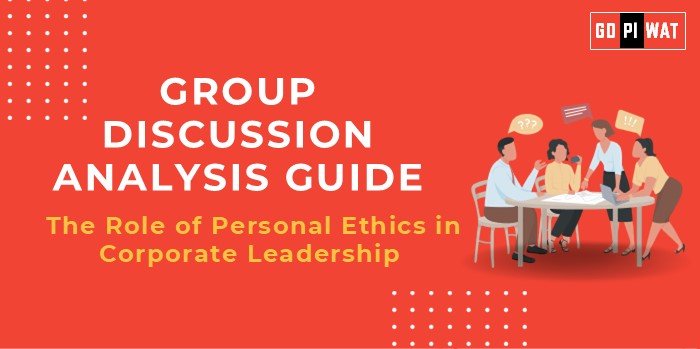📋 Group Discussion (GD) Analysis Guide: The Role of Personal Ethics in Corporate Leadership
🌐 Introduction to the Topic
- 🔍 Opening Context: “In an era where corporations wield significant influence over societies, the ethical compass of their leaders shapes not only the company’s success but also its societal impact.”
- 📖 Topic Background: The role of personal ethics in corporate leadership has gained attention in light of high-profile corporate scandals and rising demand for transparency. Ethical leadership fosters trust, guides organizational culture, and sustains long-term growth.
📊 Quick Facts and Key Statistics
– 💼 Edelman Trust Barometer (2023): 80% of consumers expect CEOs to act on societal issues.
– 📊 Global Business Ethics Survey (2022): 30% of employees perceive their workplace as having weak ethical practices.
– 💡 Corporate Reputation Study (2023): Companies with ethical leadership are 25% more profitable.
– 🌍 World Economic Forum (2022): Ethical business practices can reduce turnover by 50%.
– 📊 Global Business Ethics Survey (2022): 30% of employees perceive their workplace as having weak ethical practices.
– 💡 Corporate Reputation Study (2023): Companies with ethical leadership are 25% more profitable.
– 🌍 World Economic Forum (2022): Ethical business practices can reduce turnover by 50%.
🤝 Stakeholders and Their Roles
- 👨💼 Corporate Executives: Set ethical standards and lead by example.
- 👩💻 Employees: Ensure adherence to ethical codes.
- ⚖️ Regulatory Bodies: Monitor compliance with ethical standards.
- 🌍 Society at Large: Holds corporations accountable through consumer behavior.
🏆 Achievements and Challenges
✨ Achievements:
- 📈 Enhanced Reputation: Ethical leadership improves brand trust.
- 👥 Employee Satisfaction: Workplaces with ethical cultures see higher retention.
- 🛍️ Consumer Loyalty: Customers increasingly value companies with social responsibility.
- 💰 Profitability: Companies with strong ethics outperform peers financially.
⚠️ Challenges:
- 💸 Profit vs. Ethics Dilemma: Balancing ethical decisions with shareholder pressure.
- 🌐 Cultural Diversity: Defining universal ethical standards in global companies.
- 🔍 Greenwashing: Misrepresentation of ethical initiatives to gain public trust.
🌍 Global Comparisons:
– Norway: Strong emphasis on corporate ethics, supported by transparent governance.
– Germany: Regulations enforce strict corporate social responsibility (CSR) adherence.
📌 Case Studies:
– Tata Group (India): Pioneered ethical business practices, earning global recognition.
– Enron Scandal (USA): A cautionary tale of ethical failure.
🧠 Structured Arguments for Discussion
- ✅ Supporting Stance: “Ethical leadership is fundamental for sustainable growth, as it aligns corporate actions with societal expectations.”
- ❌ Opposing Stance: “In competitive industries, ethical compromises might become necessary for short-term gains.”
- ⚖️ Balanced Perspective: “While ethical leadership fosters trust and sustainability, its implementation can be challenging amidst profit pressures.”
🎯 Effective Discussion Approaches
- 📜 Opening Approaches:
- 📌 Use a Case Study Introduction: Refer to Tata’s ethical leadership example.
- 📊 Highlight Statistics: Frame the significance of ethical leadership using data.
- 🔍 Counter-Argument Handling:
- Acknowledge valid concerns like profit pressures, but cite examples where ethics enhanced profitability (e.g., Patagonia).
🔍 Strategic Analysis of Strengths and Weaknesses
- 💪 Strengths: Builds trust, ensures long-term success, enhances employee morale.
- ⚠️ Weaknesses: Potential conflict with short-term profit goals, cultural variability.
- 🚀 Opportunities: Increased focus on ESG (Environmental, Social, Governance).
- ⚡ Threats: Rising scrutiny, reputational risks from ethical lapses.
🎓 Connecting with B-School Applications
- 🌟 Real-World Applications: Business strategy courses focus on ethical decision-making; ethics as a key theme in leadership training programs.
- ❓ Sample Interview Questions:
- “How does ethical leadership impact corporate culture?”
- “Can ethics and profitability coexist in today’s competitive environment?”
- 💡 Insights for B-School Students:
- Ethical leadership directly correlates with trust and innovation.
- Understanding ethical dilemmas prepares leaders for real-world decision-making.


